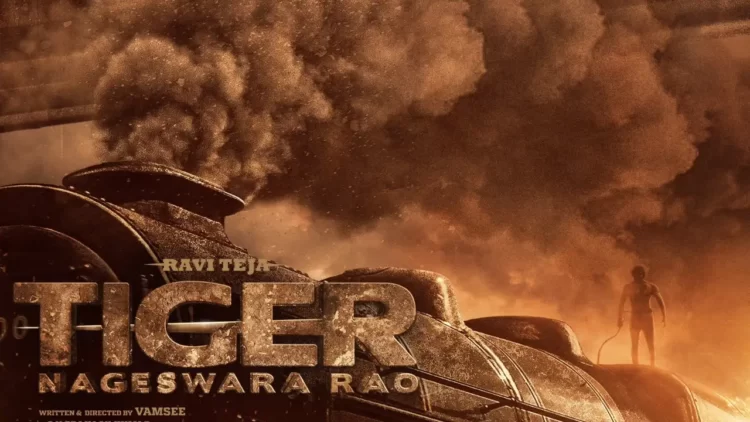Tiger Nageswara Rao: Glorification Syndrome

Star Cast: Ravi Teja, Gayatri Bharadwaj, Nupur Sanon, Anupam Kher, Renu Desai, Nasser, Murali Sharma, Jisshu Sengupta, Hareesh Peradi, and Murali Sharma. Tiger Nageswara Rao Review
Music Composed by G V Prakash Kumar
Directed by Vamsee
When a Tiger decides to hunt, the jungle shakes with fear! This is a popular saying among a few tribal groups. But when Tiger Nageswara Rao decided to hunt, he even took his breath for others. We get such kind of hyperbolas in story-telling when makers suffer from Extreme Glorification Syndrome. The makers suffering from this syndrome have these symptoms:
a) Try to present your hero as Superhero
b) No matter what he does just convert it into “Loka Kalyanam”
c) Bring mythological references that don’t sync but sound apt
d) Hero never dies – even if 100 bullets pierce through
e) Bring big actors from other languages to praise them
f) Create such legends that even legendary legends run away from being one
g) Well, Cast a popular hero
Tiger Nageswara Rao makers have ticked each and every symptom to make the film, a mess. A film like Ulidavaru Kandante [2014], presented perspectives on one incident and each one reveals a bit more story behind it, which gives us more understanding of the incident and people involved in it. Tiger Nageswara Rao makers have decided to state that even Ram can become Ravan for some while Ravan can become Ram for those who know him, closely. But in presenting a human as Ram and Ravan, they crossed the line of glorification, that is, perspective heroism and confirmed heroism.
Perspective Heroism – People state that in their view, a person is a hero.
Confirmed Heroism – A person being showcased as a hero by makers without inhibitions.
The difference between them is that characters ask to see a person through their view-finder in one case while the other one is presented as one by makers. With perspective heroism, we have the choice of believing the hero as how that character views it. With confirmed, we have no choice. In a film like Annamayya [1997], God gives us a perspective heroism – we may not feel like a person who wrote songs as a hero. But when God guides him and in the climax, asks him to be young forever and continue writing, we understand how great an achievement this one devoted writer has achieved. On the other hand, in a film like Baasha [1995], even though Manikyam turns into a criminal, we understand the reasons behind it and root for him to win. This is not just because there is a reason for his battle with Anthony but also due to his mature and commendably good nature to stick to his word, even though he is beaten, he is at risk of losing the girl who loves him or even if his own family hates him. Imagine had we seen him slapping his brother when he questions him or telling his sister to not become a doctor or talking dirty with a person who loves him – in the name of flirting. The lines are extremely blurred between making a biopic film – Schindler’s List/ Madras Cafe or Rustom/Airlift/Padman.
Tiger Nageswara Rao is written and directed by a director who made Kittu Unnadu Jagratta [2017], previously. In that movie, the problems lie in not getting the balance between fun entertainer and screwball comedy, right. This one suffers with over-dramatization, over-glorification, over-demonization, and over-acting. There is always a chance of overwriting something, if we don’t balance the heroic elements and humane nature to show the character as a human who turned hero. Rather the introduced devil is turned into God in the next hour. This transition doesn’t have a solid base. You can predict that every scene that showcases a popular actor pulling off negative shades will be presented in a positive way. Or else, there is a fool-proof way of transforming one person from being evil to a good man like in Temper [2015]. Forcing us to believe with silly connections makes Tiger Nageswara Rao, an amateur version of the real story. Real man had a very torturous childhood and the man treaded between being good and bad. Presenting such a human as human who almost transformed into being good, would have made the film more watchable. Raees [2017] suffered from not getting the transformation right and suffered with forced glorification. Here, you just wonder if we entered to watch a film or showreel made by a relative of the person with shoddy VFX and over-stretched scenes. Had the movie given four intervals, maybe we might have been able to bear the onslaught.
Ravi Teja tried his best to carry the film on his shoulders but de-aging and limitations as an actor did not help him. Writing also did not give him enough material to really rise above those limitations and carry it forward. Everything looked like a bunch of amateurs united to make a movie without really understanding the assignment. Gayatri and Nupur Sanon seem to have been added to just add glamour. Also, the prostitute sub-plot just never rises above from being an irritating and forced inclusion. Either show the flaws and good deeds or just do not touch such real-life characters. This is what we end up learning from KGF-esque screenplay that tries to be 100 films at a time. If this film can work as a de-glorification syndrome for upcoming writers, then the purpose of making this film might be realized!
Theatrical Trailer: Tiger Nageswara Rao Review
Recent Comments